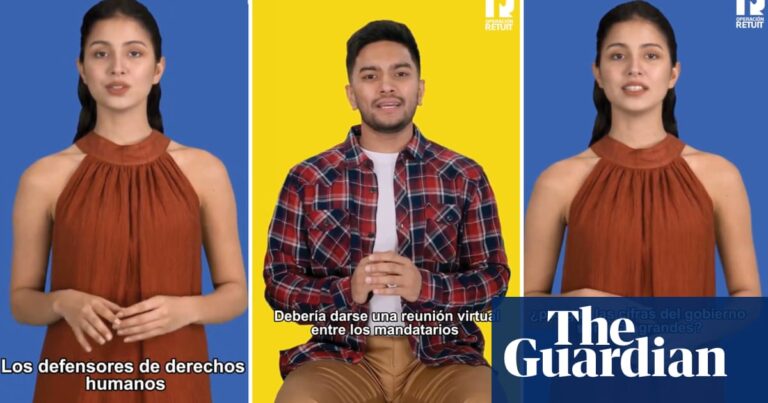Colombian Nobel laureate Gabriel Garcia Márquez, who spent some of his happiest years documenting life in Caracas, once declared journalism “the best job in the world.”
But that’s not the case when it comes to covering Venezuela today, where journalists are feeling the pressure as the South American country slides toward full-on dictatorship under President Nicolas Maduro.
Four weeks after Venezuela’s contentious election, local journalists have come up with a decidedly 21st century tactic to avoid arrest for reporting on 21st century socialism: using artificial intelligence avatars to report any news the Maduro regime deems unfit to print.
In their daily broadcasts, the AI-created news anchors have updated the world on the president’s post-election crackdown on opponents, activists and the media, without putting reporters at risk.
Carlos Eduardo Huertas, director of Conetas, a Colombian journalism platform coordinating the effort, said the use of AI is not just a gimmick but a response to “the increasing persecution and repression that our colleagues are experiencing in Venezuela, and the uncertainty about the safety of carrying out their work is growing by the minute.”
Huertas said that with the increasingly authoritarian atmosphere under Maduro’s government, “it’s no longer wise to be in front of the camera.”The solution was to create virtual journalists to hide the identities of the real reporters reporting the news.
The initiative involves around 20 Venezuelan news and fact-checking media outlets and around 100 journalists who will share content and present it as a daily news show presented by avatars called La Chama and El Pana (roughly translating as “best friend” and “partner”).
During the show’s first broadcast this month, host Besti explained her desire to spread awareness of “what is really happening in Venezuela.”
“But before we go any further, if you haven’t noticed, we’re not real,” the avatar added, before releasing the latest, all-too-real statistics on Maduro’s campaign to eliminate opposition: “In less than two weeks, more than 1,000 people have been detained during protests and at least 23 killed,” Besti said. The number of people detained now stands at more than 1,400.
The name of the AI journalism project, “Operación Retuit” (Operation Retweet), is in part a satirical reference to the name given by the Maduro regime to its harsh crackdown on dissent, “Operation Tun Tun” (Operation Knock Knock).
The prisoners include at least nine journalists, according to Venezuela’s journalists union, SNTP. One of them, 26-year-old sports reporter and photographer Paul Leon, was picked up by police while photographing a peaceful protest and later charged with terrorism offences that carry up to 30 years in prison.
On Sunday, Carmela Longo, a prominent entertainment journalist, was taken by police from her home in Caracas after being fired by the pro-government newspaper Altimas Noticias.
The need for virtual reality news anchors is easy to understand, given the political chill that has prevailed in Venezuela since Maduro was first elected president in 2013 and has only worsened in recent days.
“Sources are telling us nothing. Journalists are forced to work anonymously, sometimes going into hiding and hiding their identities for fear of government retribution. Social media accounts are silent… Key parts of the news ecosystem, like X, are blocked,” Venezuela-focused website Caracas Chronicles reported last week.
This month, Vladimir Villegas, a former president of state broadcaster VTV, claimed he had fired around 100 employees after messages he deemed hostile to the government were found in their WhatsApp chats.
The second episode of the retweet campaign takes on an especially dangerous topic given the government’s harsh crackdown: calling into question the government’s attempts to blame many of the post-election deaths on the opposition, which Maduro accuses of plotting a fascist coup.
Contrary to government claims, a collective investigation of Operation Retweet suggested that state security forces were primarily responsible for the increased death toll.
“All of the victims were killed by gunfire and witnesses said the suspects were police officers, soldiers or groups known in Venezuela as paramilitary groups. Colectivos” Buddy, the male avatar, told viewers.
The female presenter said most of the victims were under 30, with some as young as 15 killed. “They came from working-class backgrounds and had normal jobs – barbers, caregivers, students, construction workers, hawkers, motorbike taxi drivers and sports coaches,” the avatar added. “At least 15 children were left orphaned in just a few days.”
Colombian journalist Huertas likened his Venezuelan colleagues to firefighters risking their lives for democracy.
“If there’s a fire, you want to see firefighters on the scene. Well, there’s a fire right now. [in Venezuela] “Many firefighters are also present,” he said, praising Venezuela’s capable and dedicated press corps.
Despite the danger,[they] They are on the front lines doing work that society needs,” Huertas said.


